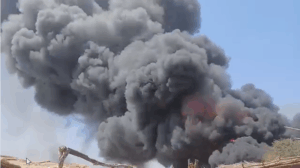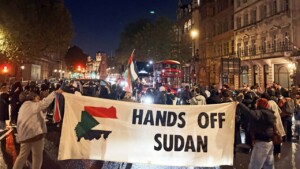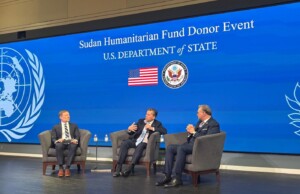Marginalised Sudanese acknowledge Radio Dabanga’s 11-year contribution to independent news
Representatives of the displaced, refugees, and teachers in the parts of Sudan that have been torn by war ever since Radio Dabanga first took to the air waves 11 years ago, have acknowledged the contribution of Radio Dabanga, it’s supporters and facilitators, and the government and people of the Netherlands in particular, with a moving vote of thanks.
 Leon Willems, one of the founders of Radio Dabanga and Director of the Netherlands-based organisation Free Press Unlimited, receives a sash embroidered by the displaced women of the Nyala camps, and a gift of traditional Sudanese garments (mandola), from representatives of the marginalised people in Sudan
Leon Willems, one of the founders of Radio Dabanga and Director of the Netherlands-based organisation Free Press Unlimited, receives a sash embroidered by the displaced women of the Nyala camps, and a gift of traditional Sudanese garments (mandola), from representatives of the marginalised people in Sudan
Representatives of the displaced, refugees, and teachers in the parts of Sudan that have been torn by war ever since Radio Dabanga first took to the air waves 11 years ago, have acknowledged the contribution of Radio Dabanga, it’s supporters and facilitators, and the government and people of the Netherlands in particular, with a moving vote of thanks.
At a function at the Residence of the Netherlands embassy in Khartoum on January 22, Leon Willems, one of the founders of Radio Dabanga and Director of the Netherlands-based organisation Free Press Unlimited – which has facilitated Radio Dabanga operations since its inception and still hosts the radio station’s studios and editorial offices in Amsterdam – was presented with an embroidered sash and a gift of traditional Sudanese garments (mandola) as a token of the appreciation felt by the marginalised people of Sudan.
The embroidered inscription (in Arabic) on the sash, made by the women of the Nyala camps, reads: “In appreciation and recognition by the Sudanese people, in particular, the displaced, refugees, and teachers in the conflict areas, of Mr Leon Willems and the Dutch people.”
Representatives included several of the 23 Heroic Voices of Dabanga that Radio Dabanga acknowledged later at a celebration event at the National Museum in Khartoum on January 22. Dabanga Hero Aziza Abdallah represented the displaced of Kabkabiya, Amina Gamdradin representing the displaced of South Darfur, Hussein Abusharati, the spokesperson of the displaced and refugees in Darfur, and Central Darfur displaced leader El Shafi Abdallah, all of whom have kept Radio Dabanga supplied with up-to-date reports from the heart of the conflict areas.
They expressed their deep gratitude “to all those supporters and facilitators that make Radio Dabanga happen”.
'In appreciation and recognition by the Sudanese people, in particular, the displaced, refugees, and teachers in the conflict areas, of Mr Leon Willems and the Dutch people'
They emphasised their thanks for the efforts of those who have facilitated Radio Dabanga, Free Press Unlimited, donors and benefactors, and especially the people and the government of the Netherlands for affording Radio Dabanga a safe haven in exile, to be “the voice of the voiceless” during a time when Sudanese media was curbed by the draconian restrictions imposed by the Al Bashir regime.
Willems and Radio Dabanga editor-in-chief Kamal El Sadig made the first official visit to Sudan since this station was established in exile in Amsterdam 11 years ago.
At the start of their visit on January 19, they met with Sudan’s Prime Minister Abdullah Hamdok, who expressed his gratitude and appreciation “for the fundamental role that Radio Dabanga has played over the years in the fight of the Sudanese people for democracy, justice, prosperity, and peacebuilding”.
“You were the voice of the Sudanese people at a time when the Sudanese within the country were forcefully silenced. For that the Sudanese people will not forget the fundamental role Radio Dabanga played,” PM said. We really appreciate the role of Radio Dabanga, he added.

and Amina Gamdradin representing the displaced of South Darfur

and Aziza Abdullah representing the Kabkabiya camps and the surrounding areas, including Sortony camp

watches Leon Willems unwrap the package
Radio Dabanga’s editorial independence means that we can continue to provide factual updates about political developments to Sudanese and international actors, educate people about how to avoid outbreaks of infectious diseases, and provide a window to the world for those in all corners of Sudan. Support Radio Dabanga for as little as €2.50, the equivalent of a cup of coffee.












 and then
and then